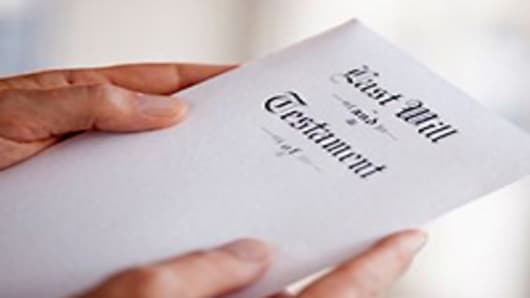“Most people have the traditional legal documents, but they don’t have a simple Family Love Letter,” says Craig Silverman, retirement planning specialist with AXA Advisors in Melville, NY.
The letter that Silverman is referring to is a 50-page document, created by Jeff Scroggin, partner in Scroggin & Company in Roswell, Ga., and includes an inventory of advisors, assets and other information. It even contains details like account passwords, what frequent flyer miles you have, and if a neighbor owes you money.
While working on complicated tax documents several years ago, Scroggin realized nobody had ever thought of simple stuff like putting down whereabouts of a bank safety deposit box.
Scoggin learned the value of this the hard way. Scroggin's father, a decorated veteran, died with the wish that be buried in Arlington National Cemetery. Scroggin tried to fulfill the request, but realized he needed certain discharge papers. “I ended up finding them in a book mark in a book in his house,” he says.
A critical section of the Letter is the personal property list.
“There could be a million dollars of difference in inheritances and no one gets upset about that, but I’ve seen adult siblings shouting about a little yellow tweety bird that sat in their mother’s kitchen for forty or fifty years,” continues Scroggin.
Trust In Trusts
If you have a sizable estate or minor children to provide for, setting up a trust makes better sense for tax planning than leaving everything outright to your heirs, says Louis Mezzullo, Partner at Luce, Forward, Hamilton & Scripps in Rancho Santa Fe, California.
“The beauty of trusts is that they are as flexible as you want them to be,” adds Scroggin.
For example, if you want to distribute five percent of the annual income of a particular trust to your daughter every year, but no more, you can do that with a total return trust. On the other hand, if you don’t like required distribution, the trustee can be given absolute discretion of how, when and where. You can also specify that the money in a trust be spent only to educate children or grandchildren, and not on traveling through Europe.
Another reason that trusts are attractive, says Mezzullo, is that in many states, estate administration is time consuming and the probate tax is expensive, so many people try to avoid having their assets pass through probate by having them held in a revocable living trust (one that is set up when you are alive rather than when you die).
In addition to a will and trusts, Mezzullo and Scroggin agree that everyone should have medical directives, a living will and general power of attorney.
“The absolute number one rule is make sure that retirement account and life insurance beneficiaries are up to date,” says Herb Daroff, Registered Investment Advisor at Baystate Financial Planning in Boston, Massachusetts
This is important because beneficiary designations override your will. Retirement plan beneficiaries have become big issues, particularly in divorces. If the decree says the two divorcee’s assets are completely separate, but one dies in a car accident a year later and didn’t change his or her beneficiary designation, the ex gets the money.
Another thing which Silverman frequently finds is that there are no contingent, or second in line, beneficiaries. If, for example you name your wife as the beneficiary for your IRA life insurance, and don’t put your children second, it can go through probate if the first beneficiary is no longer around to collect.
"Today, the largest asset in most people’s taxable estate is going to be their retirement account, and you need to have adequate life insurance to be able pay the income taxes on these assets,” says Daroff.
Protecting Your Retirement Income
Here's why. Traditionally, people think of life insurance as something they need only during the pre-retirement period to pay off debt or cover expenses. However, Daroff suggests people have policies in place through the retirement years and arrange for their estate to apply the payout to the income taxes that the beneficiary will have to pay on retirement accounts.
Another life insurance tip, says Daroff, is that make sure that you are the owner of your own policy. In other words, it should be held outside the taxable estate in a proper trust. The reason is to protect your estate from the tax it will have to pay on the death benefit. Silverman recommends setting up an Irrevocable Life Insurance Trust (ILIT) when his clients are close to the estate tax limit.
If you are married, it is a good idea for tax planning purposes to split assets between yourself and your spouse. What frequently happens is that one partner tends to have more earnings and savings, as well as a bigger retirement account, and the overwhelming majority of the assets are in that person’s name. That preserves more of the potential inheritance.
Traditionally, estate planning has dealt with taxes, guardianship for minor children, and trusteeship for assets. However, these days people are considering how to manage the assets for the surviving spouse, kids, and grandkids.
You need to ask yourself what is the purpose of the money—is it just to provide income for your spouse, or is the money expected to run for several generations, or educate your grandchildren. Then, you need to decide if you want to restrict the kind of investments that fiduciaries can get into.
“People should do what they want, regardless of the tax consequence," says Mezzullo.


